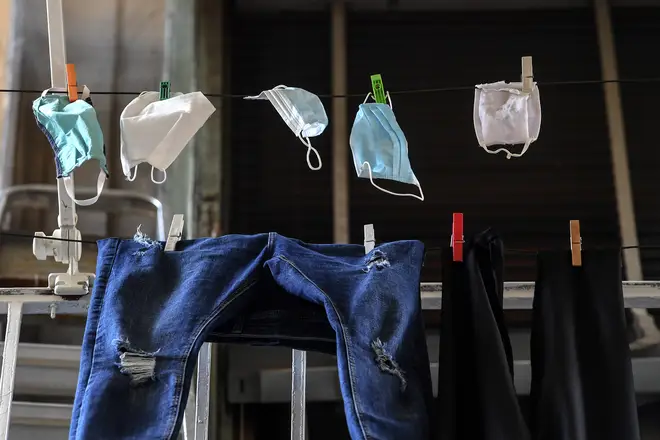
Ali Miraj 12pm - 3pm
29 May 2020, 14:19

Wearing face masks at home might help curb the spread of coronavirus among members in the same household, but only before symptoms develop, new research suggests.
A study of Chinese families in Beijing found the practice was 79% effective at stopping the spread of transmission before symptoms emerged in the first person infected.
However, according to the paper published in the BMJ Global Health journal, wearing face masks at home was not protective once Covid-19 symptoms began to show.
The authors, wrote: "This study confirms the highest risk of household transmission being prior to symptom onset, but that precautionary NPIs (non-pharmaceutical interventions) such as mask use, disinfection and social distancing in households can prevent Covid-19 transmission during the pandemic."
READ MORE: How to make a face mask at home
They add that household transmission is a major driver of epidemic growth and the findings could "inform precautionary guidelines for families to reduce intrafamilial transmission in areas where there is high community transmission or other risk factors for Covid-19".
Public Health England has not recommended the use of face masks but the public is advised to consider wearing face coverings in enclosed public spaces such as shops, trains and buses.

The researchers asked 335 people from 124 families - with at least one laboratory-confirmed Covid-19 case between late February and late March 2020 - about their household hygiene and behaviours during the pandemic.
The researchers analysed what factors might increase or decrease the risk of catching the virus within the incubation period - 14 days from the start of that person's symptoms.
They found that during this time secondary transmission - spread from the first infected person to other family members - occurred in 41 out of the 124 families.
A total of 77 adults and children were infected in this way, giving an "attack rate" of 23%, the researchers say.
About a third of the study children caught the virus (36%) compared with more than two-thirds of the adults (69.5%).
The study found that 12 of the children had mild symptoms and one had none.
Some 83% of the adults had mild symptoms, around one in 10 had severe symptoms and one person became critically ill.

How to make your own face mask
Daily use of disinfectants, window opening and keeping at least one metre apart were associated with a lower risk of passing on the virus, even in more crowded households, the researchers found.
The study indicates that frequent contact in the household increased the risk of transmission 18 times and diarrhoea in the index patient increased the risk by four times.
The researchers wrote: "Results demonstrate the importance of pre-symptomatic infectiousness of Covid-19 patients and shows that wearing masks after illness onset does not protect."
A face mask worn before symptoms started was 79% effective, and disinfection 77% effective, at stopping the virus from being passed on.